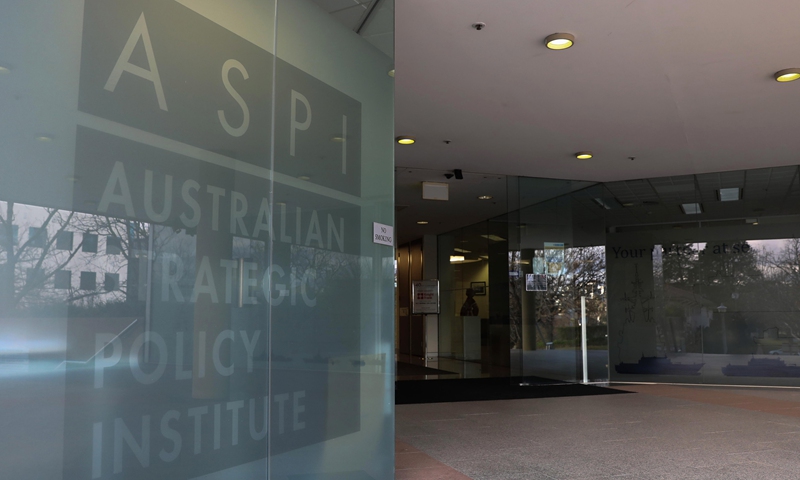IN-DEPTH / IN-DEPTH
ASPI 'showing off' US funds reflects essence of Western think tanks as tools of diplomacy, political manipulation

The photo taken on June 23, 2020 shows the logo of Australian Strategic Policy Institute in an office building, in Canberra, Australia. Photo: Xinhua
An Australia-based think tank that has long served as an anti-China vanguard has recently published its revenue for the past year, showing that the Australian and US governments are its major funding sources. Analysts noted that this reflects the essence of such Western think tanks as nothing but tools for political manipulation and even a incitation to color revolutions, which would spread false information, mislead the public and poison public opinion.
According to the 2020-2021 revenue of the Australian Strategic Policy Institute (ASPI), founded in 2001 and self-proclaimed as "independent," the think tank received A$4 million ($2.7 million) from the Department of Defence of Australia, accounting for 37.5 percent of its total funding for the year.
In total, more than 80 percent of its funds are from the Australian and other Western governments.
Moreover, the US Department of State has been the biggest source of overseas funds.
According to the revenue report, the funds from the Australian government, its allied countries and the defense industry account for 87 percent of ASPI's revenue, while funding from the public, universities and the private sector is only slightly above 10 percent.
The ASPI has never been independent as it has claimed and it is no longer a secret that it is the mouthpiece of Australia's military-industrial complex.
"Think tanks are born to influence or serve policies. The ASPI is just another case to prove that think tanks in the West are actually tools for governments to apply diplomatic policies and spread influence," Li Haidong, professor at the Institute of International Relations of the China Foreign Affairs University, told the Global Times on Sunday.
"These think tanks are never independent or objective but are the extension of governmental organs. In another word, they are basically a part of the government," Li said.
It is also notable that the funds provided by the US Department of State to the ASPI are mainly used to smear China.
One of the expenditures of A$985,140 ($700,000) provided by the US Department of State shows that it was used on various International Cyber Policy Centre (ICPC) projects, including "Xinjiang human rights, China tech and systems of influence projects."
Under another expenditure of more than A$590,000 ($423,000), the US Department of State demanded the ASPI to smear China's talent plan, social media opinion and tech industries.
These two funds used to lambast China accounted for around 80 percent of ASPI's overseas funding in the past year.
It is actually only the second time that the ASPI publishes its annual revenue. Therefore, how much funding has the US Department of State provided in the past two decades to the ASPI remains unknown.
Besides the US, other Western countries including the UK and the Netherlands, also have provided funds to smear China through their embassies. Specifically, the UK Embassy in China provided A$20,000 ($14,300) to support a "Uygur for sale" research project, while funds from the Netherlands went to support a project targeting China's United Front work.
"What such think tanks have been doing has great destructiveness," Li said adding that "they could deceive the public and poison opinion and media to make sure the government could make policies based on its control of public opinion."
These think tanks, no matter in what kind of form, are just a segment that promotes the implementation of their countries' policies. "They are far from independent and objective but use the identity of 'third parties' to deliver false information," Li said.
He noted that the think tanks could lead the public in the West to blindly follow the governments' policies which sometimes do not have good purposes, such as the activities of think tanks when Western governments incite color revolutions or similar uprisings around the world.
It is not clear why the ASPI decided to publish its revenue in the past two years. But analysts believe that some forces in the West have been losing their bottom lines when facing the rise of China and are showing their decay and failure in confronting the pandemic. The ASPI "showing off" the financial support from the US government might be a reflection of such trend.
The ASPI has long been smearing China with false and fabricated information. For instance, in 2020, it used some satellite images as evidence for their claim of Xinjiang's expanding "concentration centers," a term that has been firmly opposed by Chinese authorities. However, the locations the ASPI denounced were found to be administration buildings, nursing homes, logistics centers or schools.
China's Foreign Ministry called the institute "unreasonable" in October 2020 and described the institution as "not independent or scientific."
